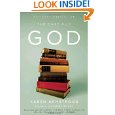 In a post near the beginning of this series I summarized Armstong’s views of Jesus Christ and Christianity. Go back and read that post if you need to. In this post I’m going to touch about my concerns with her presentation here.
In a post near the beginning of this series I summarized Armstong’s views of Jesus Christ and Christianity. Go back and read that post if you need to. In this post I’m going to touch about my concerns with her presentation here.
One Sided Unknowning is Actually A Special Case of Knowing
First, I note that for someone whose whole religious practice is built on “unknowing” that there doesn’t seem to be the slightest bit of “unknowing” when it comes to Jesus Christ. She is completely certain that He only taught that he was a non-unique son of God in the same sense that we all are. She is completely certain that He was not ‘bodily resurrected’ but that rather people just saw visions of Him. She is completely certain that He would have been in favor of self-emptying and her apophatic method. No other possibility is considered or discussed at all.
This ‘certainty’ that Armstrong easily asserts when necessary brings up a larger issues: Theological Liberals of the Armstrong variety seem to only believe in their beliefs when it’s convenient. Unknowing is only exalted right up to the point that it encourages their own beliefs. If it ever doesn’t, then ‘certainty’ becomes okay after all. Likewise, ‘not having the final word about God’ is only true if you mean everyone else but Armstrong-like Liberals. They really do have the final word on several subjects, namely all the ones they care about and that their religious beliefs are anchored on. So in this sense, they aren’t really different from their ‘conservative’ counterparts. Armstrong really does act as if she believes she gets the ‘final say’ when it comes to Jesus Christ. Continue reading
Continue reading
